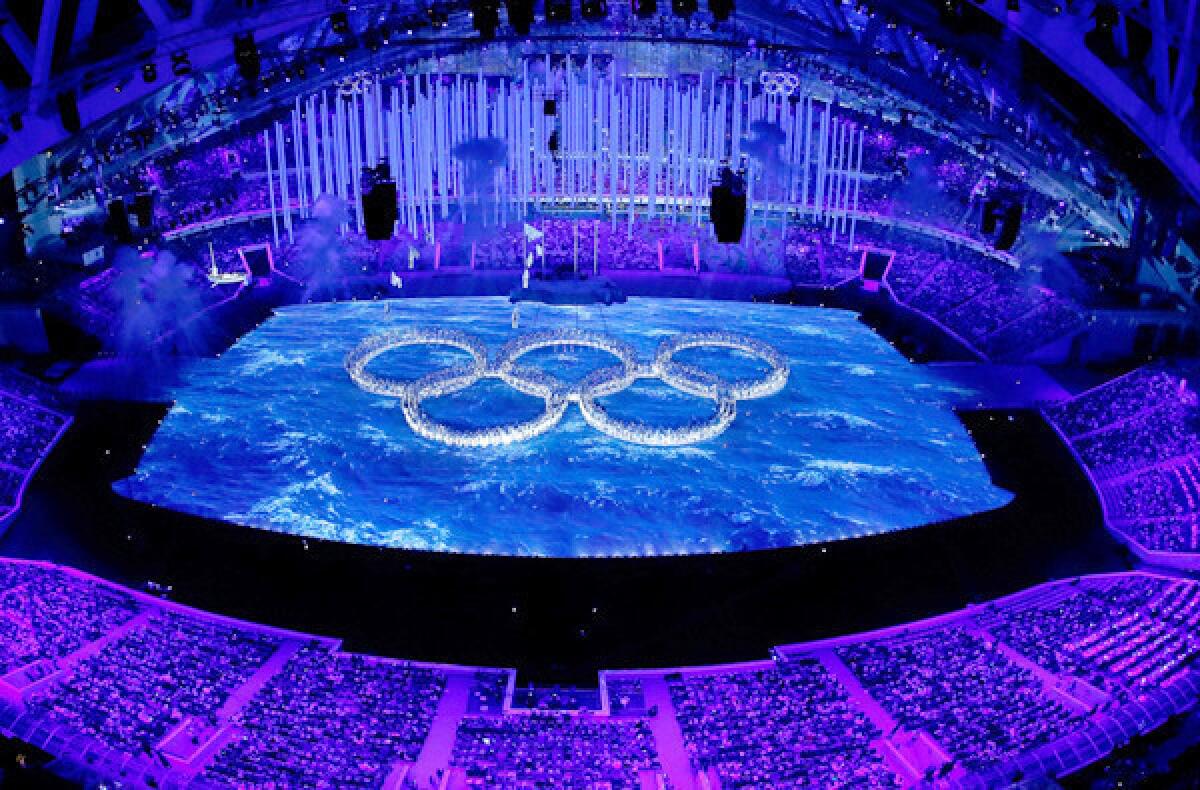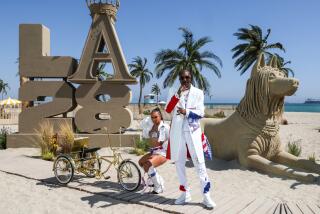Sochi Olympics are nearly flawless but devoid of joy

- Share via
SOCHI, Russia — The young arena worker approached with a raised hand, so I stopped and sighed. I had been in Russia for two weeks. I knew the drill. I was walking somewhere I should not be walking. I spun in my mud-caked hiking boots and began to walk in the other direction.
But the worker jumped in front of me again with the same raised hand. It turns out she only wanted to share a high-five. I happily obliged, then slinked away, too embarrassed to tell her it was the first time at these Olympics I had witnessed anything from our hosts resembling spontaneous joy.
FRAMEWORK: Best images from Sochi
On a practical level, the Sochi Games were nearly perfect. Once the early hotel problems were solved, the Games ran smoother than any of the nine Olympics I have covered. The buses were on time, traffic was nonexistent, the arenas were clean and functional, the events occurred without a glitch and the feeling of safety was palpable.
After weeks of worry, the pre-Games fears of terrorism, infrastructure issues and ugly demonstrations never materialized.
But those fears, sadly, seemed to scare away the soul of the Games.
The Ring of Steel instituted by Russian President Vladimir Putin successfully protected the Olympic Games but also excluded much of the Olympic magic.
There were no impromptu parties on city streets, because there were no city streets running through the heavily barricaded Olympic sites. There was little bonding between Olympic visitors and locals, because the language and cultural difference offered little common ground with no easy way or place to forge it. It figures that one of the few connections with the Olympians and their surroundings occurred with their embrace of Sochi’s many stray dogs, who seemed to be the only local creatures allowed to completely roam free, and even then, not for long.
The center of these Olympics was a giant and cold concrete slab where mostly wealthy Russians gathered to buy $60 lunches, wait two hours to enter the souvenir shop, and shiver through obscure entertainment acts that preceded nightly medal ceremonies. With rare exceptions such as the gold-medal presentation for the Ukrainian women’s biathlon team, Olympic Park felt mostly empty and cautious.
There will be high praise justifiably given many aspects of Putin’s $51-billion project. That it kept everyone safe should be enough to call this an unqualified success. One need only drive the new highway from the Black Sea to the Caucasus Mountains — and notice the security guards standing in every nook and cranny of the foothills — to admire the result of the investment.
But the Olympics shouldn’t be just a project. They should also be a party. Folks here were too cautious to party.
Of course, it’s hard to blame anyone here for keeping their mouth shut, considering that last week Cossack security men were videotaped manhandling — and in one case whipping — members of the protest group Pussy Riot in Sochi.
This is, of course, the viewpoint of a visiting American in what truly felt like a distant land for Team USA. In two weeks I did not meet one visiting American who was not related to an athlete and heard only sporadic “U-S-A” chants. It seemed as if the lack of connection was also felt back home. While Mikaela Shiffrin, Meryl Davis, Charlie White and a bunch of cool extreme athletes were the best American stories from the medals podium, the hottest stories in America were Bob Costas’ red eyes and Johnny Weir’s pink jacket. Even the one time when an American shed Olympic-size tears — usually a connecting moment for all — NBC was ripped for goading Bode Miller into crying.
It was an Olympics that seemingly had everything yet lacked the friendliness of Vancouver, the craziness of Turin and the spirit of Salt Lake City. It was the All-Business Olympics, and though the Russians were surely doing what they felt was necessary to protect the face of the Games, it’s a shame they had to sacrifice some of its heart.
At the opening ceremony two weeks ago, giant electrical floating snowflakes formed only four of five Olympic rings, creating the image of something bright, powerful, but somehow incomplete. At the time, it was called a malfunction. Two cold weeks later, it seems like a premonition.
Twitter: @billplaschke
More to Read
Go beyond the scoreboard
Get the latest on L.A.'s teams in the daily Sports Report newsletter.
You may occasionally receive promotional content from the Los Angeles Times.







